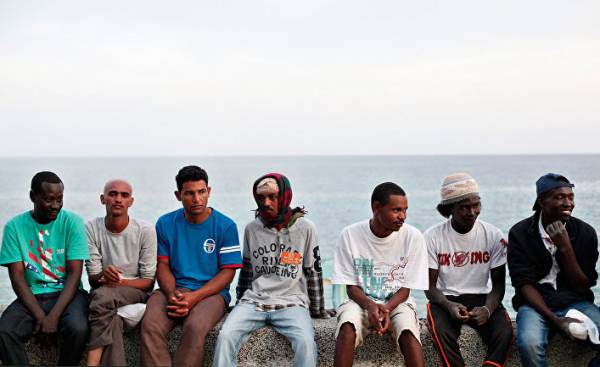
Instability in several African countries encouraged emigration, while the development of the Libyan conflict complicates the task of Europeans who strive to find effective and sustainable solution to the immigration crisis.
Atlantico: According to the former head of the British Embassy in Benghazi, “a million migrants from Central Africa and the horn of Africa” are potentially ready to go to Europe from Libya. What do you think about this numbers?
Gerard-Francois Dumont (Gérard-François Dumont): the Figure of a million would-be migrants not to call it impossible, especially given the alarming situation in several African countries. In Mali, the French operation “Serval”, which was supported by the UN and several African States have allowed to displace threatening to Bamako by Islamists.
Whatever it was, the country had still not achieved national understanding and is not stable, while the terrorists managed to perform surgeries in Burkina Faso. Niger, which along with Liberia is the poorest country in Western Africa, still can’t find the way of development. Eritrea is suffering under the yoke of an authoritarian regime, and in Sudan and South Sudan are violent conflicts. In other African countries the situation is not necessarily much better, because of the decline in revenues from oil rents, and due to its inefficient use. While economic growth in some countries and may seem satisfactory, some young people are not optimistic about the future. In such conditions they try to find the best opportunities to earn money for themselves and send money home. All this may push them to migrate to Europe, which seem attractive to them.
Second, there are the smugglers, who exploit this population, and promised him mountains of gold to get the money from the families of potential migrants. This point also contributes to migration.
Thirdly, Libya absolutely out of balance. It has become a transit zone where smugglers can act quite freely. Don’t forget that some Libyan politicians want to use these migrants as a means of geopolitical pressure on European governments.
Finally, the situation is different from the one that prevailed in Mesopotamia. Many Syrians among those who fled from civil war in Turkey, Lebanon and Jordan, do not want to go to Europe. They remain close to the homeland, to the need to go there. In addition, they hope to end the conflict and rebuild the country that would allow them to return home. With the African migrants, they set a goal to earn enough to be able to send money home.
— What can threaten Europe new brewing migration crisis?
— With regard to migration from Africa to Europe via Libya, it would be a mistake to speak of a new migration crisis. The fact that he has long been started, although one time it was eclipsed by a stream of people from Mesopotamia. Various Libyan groups from the end of 2011, I use migration to achieve international recognition of European countries. Moreover, this process is closely linked to the development of the conflict. Today, at least in the East, there is a strong leader, General Khalifa Haftar, who enjoys the support of Egypt, and in 2016 (almost officially) — Russia and the Parliament of Tobruk. In such a situation opposed to the General Haftorah Libyan policy (especially in the Western part of the country) want to keep the recognition of the European governments, which in March 2016 gave impetus to the formation in Tripoli, so-called government of “national unity”. One of the levers politicians from the West of Libya is the promise to control migration for European countries have recognized them at the international level and provide financial and material resources to fulfil promises. This method resembles the one which was used by Turkey of Erdogan, especially in 2015.
A draft Memorandum between Italy and Libya, the agreement with several African countries on the return of those who had been refused asylum, etc. What do you think about the EU’s attempts to resolve the migration problem?
— Here you need to draw the line. Regarding Libya, it is difficult to imagine that a Treaty with its representatives can give tangible results: the country is in political anarchy. There is no power that would keep control of the situation throughout the Libya, or at least a significant part of it is that it does not preclude relations between representatives of the Libyan leadership and exploiting migrants mafia groups.
At the same time, the signing of agreements looks preferable from other African countries to ensure their sovereignty power. A beginning that had begun with Nicolas Sarkozy. However, everything came to a halt when Francois Hollande, who did not continue the contractual initiative with African countries, and stopped and buried them under the mere pretext that it was the idea of Sarkozy.
Italy, apparently, plays an important role in the regulation of migration matter what they say, the Memorandum and decision of the European stability initiative on the opening of the country’s centers of accommodation and consideration of asylum applications within four weeks three months with the subsequent repatriation of those who had been refused (provided that their country would be considered “safe”). What can you say about the place of Italy in such a mechanism?
— It is necessary to turn to history. It tells us that the difficulties of France to Calais began with the end of 1997, i.e. since the moment it was decided to take Italy to the Schengen area, without taking into account the fact that its inhabitants were not able to follow the rules of this system, as due to the lack of administrative funds, and in connection with the strong presence of mafia groups doing business in migration.
Both of the considered solutions seem difficult to implement. With regard to the negotiations with Libya, is once again to remind you that there are only political groups, and there is no force that would control the entire territory. Thus, an agreement with one group does not prevent others to proceed in this area and share profits from the work of smugglers.
As in the case of Turkey, on the aversion of the Syrians and Iraqis, the construction of accommodation centres in Italy, only plays into the hands of smugglers. Because migrants begin to engage in only after they got into the European territory, paying them exploited the plight of the smugglers. Turns out the same risk that the question going through Turkey migration flows: all this only delays the crisis, which is causing a split among European countries and the disappointment in the EU.






